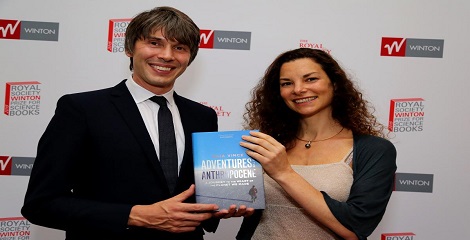For the first time in its 28 years history, the most prestigious science book prize in Britain has been won by a solo female writer named Gaia Vince at a ceremony in London.
The Royal Society Winton prize for Science Books awarded £25,000 (around USD 38,000) to the London-based journalist, for her work on gathering first-hand accounts of the environmental changes caused by human activity throughout the globe.

About her work:
Gaia Vince quit her job as an editor at the journal, to spend more than two years travelling the world to research. She spent 800 days on the road collecting information for her book – “Adventures in the Anthropocene: A Journey to the Heart of the Planet We Made”. The book centers on how people from different parts of the world have developed creative, albeit desperate, solutions to the most critical ecological issues during what scientists call the Anthropocene. She described the Anthropocene as a period of time in which human activity has become a massive geological force that has extensively altered the environment.
The book is illustrated with photographs taken by Vince’s partner, Nick Pattinson, who captured remarkable shots, from an Indian civil engineer’s manmade glaciers, to Peruvians painting parts of the Andes white to cool it down, and that island made of garbage.
List of other Shortlisted books:
Other Shortlisted titles for the award were – Life’s Greatest Secret (Profile) by Matthew Cobb, Alex Through the Looking-Glass: How Life Reflects Numbers and Numbers Reflect Life (Bloomsbury) by Alex Bellos, Smashing Physics (Headline) by John Butterworth, Life on the Edge: The Coming of Age of Quantum Biology (Bantam Press) by Johnjoe Mcfadden and Professor Jim Al-Khalili, and The Man Who Couldn’t Stop (Picador) by David Adam.
About the Award:
The Royal Society Winton Prize for Science Books is an annual £25,000 prize celebrating outstanding popular science books from around the world. It is open to authors of science books written for a non-specialist audience, and over the decades has championed writers such as Stephen Hawking, Jared Diamond, Stephen Jay Gould and Bill Bryson and many more.
It was originally established as the “Science Books Prize” in 1988 with the aim of encouraging the writing, publishing and reading of good and accessible popular science books. Earlier in 1990-2000 it was known as the “Rhone-Poulenc Prize for Science Books”, in 2001-2006 as the “Aventis Prize for Science Books” and in 2007-2010 as the “Royal Society Prize for Science Books”.




